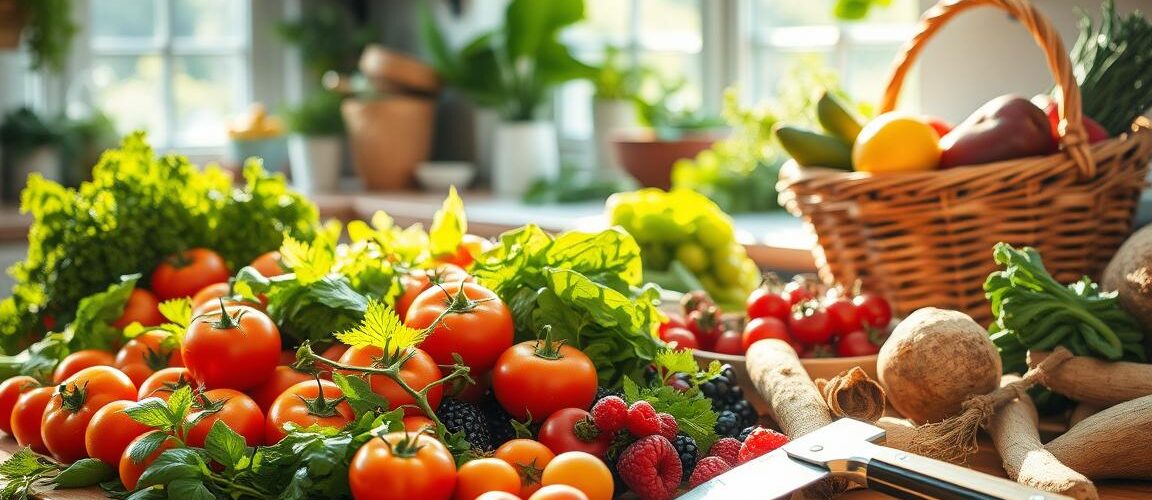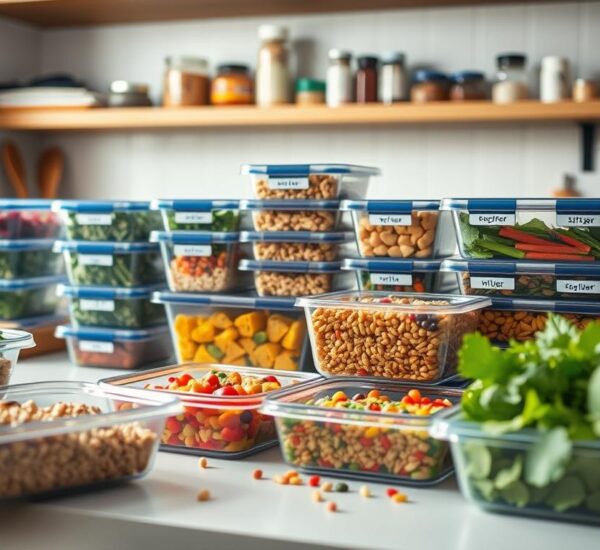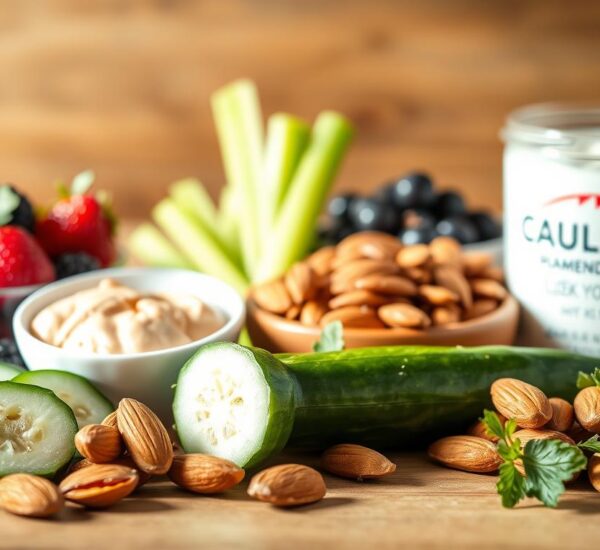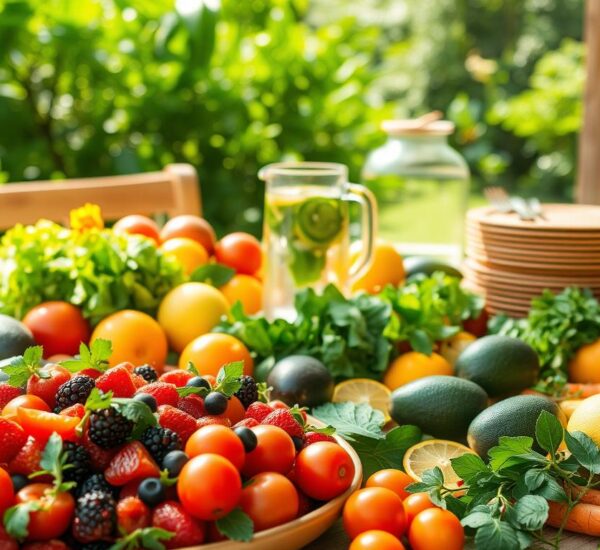Do you know how your food choices affect your health and the planet? Many of us are now choosing organic foods because of concerns about synthetic fertilizers, pesticides, and genetically modified ingredients. This is a healthier option.
Choosing the right food can be a daunting task. But, knowing the benefits of certain farming methods can make a big difference. The Mayo Clinic says eating foods grown with government-approved methods can lower pesticide exposure. This is very important during key life stages, like pregnancy.
By choosing organic produce, we improve our health and support sustainable agriculture. Exploring the benefits of this choice helps us see how it makes our diet better and our food system greener.
Key Takeaways
- Reduced exposure to pesticide residue
- Support for sustainable agriculture
- Healthier dietary choices
- Government-regulated farming methods
- Environmental benefits
Understanding Organic Foods
Organic foods are becoming more popular. They are grown and processed naturally. This means no synthetic fertilizers, pesticides, or genetically modified ingredients are used.
The U.S. Department of Agriculture says organic crops are grown without most synthetic chemicals. This is for three years before they are harvested. It shows how important it is to care for the soil, keep biodiversity, and balance ecosystems.
What Are Organic Foods?
Organic foods aren’t just fruits and veggies. They also include meat, dairy, and processed items made from organic ingredients. The main thing about organic foods is they’re made without synthetic chemicals. These chemicals can harm our health and the environment.
Choosing organic foods has many benefits:
- Less exposure to pesticides and chemicals
- Supports sustainable farming
- May have better nutrition
- Helps keep ecosystems diverse
Key Differences Between Organic and Conventional Foods
Organic and conventional foods are made differently. Organic farming doesn’t use synthetic fertilizers or pesticides. But conventional farming often does to grow more and fight pests.
Here’s a comparison of the two:
| Characteristics | Organic Foods | Conventional Foods |
|---|---|---|
| Farming Practices | Natural methods, no synthetic chemicals | May use synthetic fertilizers and pesticides |
| Pesticide Use | No synthetic pesticides | May use synthetic pesticides |
| Genetic Modification | No genetically modified organisms (GMOs) | May contain GMOs |
Knowing these differences helps us choose better for our health and the planet.
Health Benefits of Organic Foods
Organic foods are good for our health. They can make us feel better and lower the chance of getting sick.
Organic foods are packed with nutrients. They often have more vitamins and minerals than non-organic foods.
Nutritional Advantages
Organic foods are full of antioxidants and other good stuff. They can protect us from serious diseases. For example, organic fruits and veggies have more antioxidants than regular ones.
- Higher levels of vitamins and minerals
- Increased antioxidant content
- Potential for improved overall nutrition
Reducing Chemical Exposure
Organic foods also mean less exposure to pesticides and heavy metals. Organic farms don’t use synthetic chemicals. This keeps our food clean.
- Lower levels of pesticide residues
- Reduced risk of heavy metal contamination
- Minimized exposure to harmful chemicals
Environmental Impact of Organic Farming
Organic farming is a sustainable choice for our food. It focuses on soil health, biodiversity, and ecosystem balance. This can help lower pollution and support local ecosystems.
Choosing organic foods supports sustainable agriculture and cuts our carbon footprint. This farming method benefits the environment and helps our planet for the future.
Supporting Biodiversity
Organic farming is key to keeping biodiversity alive. It avoids synthetic fertilizers and pesticides, preserving ecosystem balance. This method:
- Protects wildlife and pollinators
- Improves soil quality and fertility
- Uses water more efficiently
Supporting local farmers who use organic practices helps biodiversity. Local farmers markets and organic food delivery are great ways to make a difference.
Reducing Pollution
Organic farming greatly reduces pollution. It avoids synthetic chemicals, lowering the risk of soil, air, and water contamination. This improves environmental health and makes our food safer.
Adopting organic farming and sustainable agriculture reduces our environmental impact. This makes organic food delivery and shopping at local farmers markets more than just choices. They are steps towards a sustainable future.
Common Misconceptions About Organic Foods
Exploring organic foods, we must clear up common myths. Many people worry and misunderstand organic foods. We’ll tackle these myths and shed light on organic foods’ benefits and what they are.
Price vs. Quality Debate
Many think organic foods are too pricey and not better in quality. But, the cost difference comes from organic farming’s labor and sustainability. While some organic items might cost more, their lower pesticide levels and higher nutrients make them worth it.
| Characteristics | Organic Foods | Conventional Foods |
|---|---|---|
| Farming Practices | Uses natural methods, avoiding synthetic fertilizers and pesticides | May use synthetic fertilizers and pesticides |
| Pesticide Residues | Generally lower levels | May contain higher levels |
| Nutrient Levels | May have higher levels of certain nutrients | May have lower levels of certain nutrients |
Myth of Organic Foods Not Being Pesticide-Free
Some believe organic foods have no pesticides. While organic farming avoids synthetic pesticides, it’s not entirely accurate to say that organic foods are pesticide-free. Organic farming might use natural pesticides, which are safer for people and the planet.
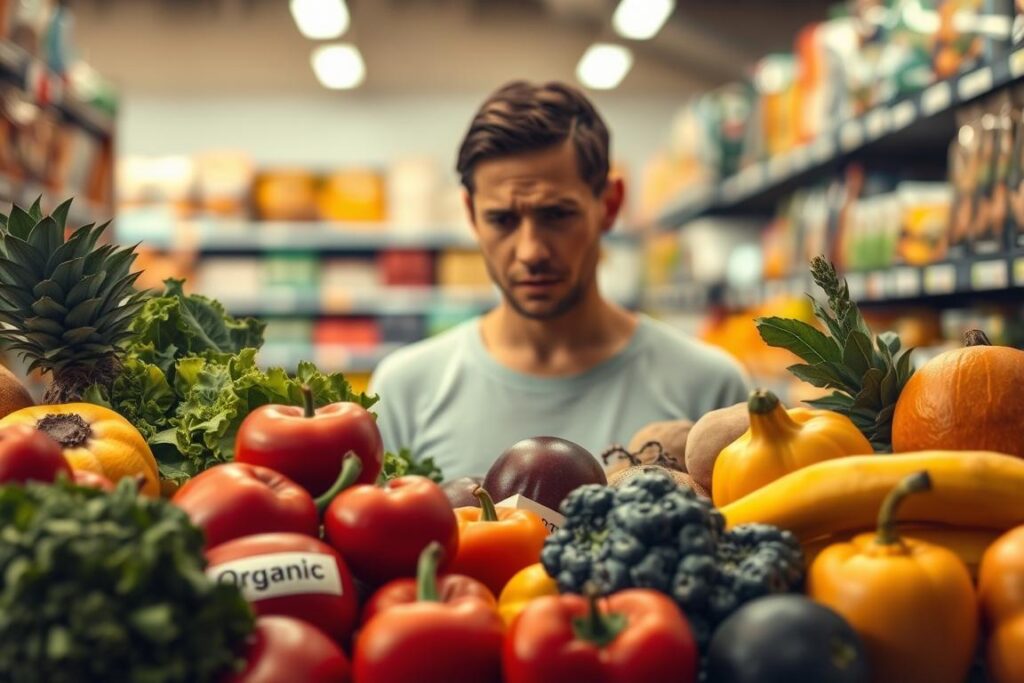
By understanding these myths, we can make better food choices. Organic foods have many benefits, like lower pesticide levels and supporting sustainable farming.
How to Identify Organic Foods
Finding organic foods can be a bit tricky, but it’s worth the effort. Knowing how to spot them can make a big difference in our health. It’s key to understand how to identify organic foods.
First, we need to know what to look for when buying organic. We should recognize the labels and certifications that show a product is organic.
Reading Labels
When we shop for organic foods, reading labels is essential. We should look for signs that a product is organic. The label should say it’s made from organic ingredients or is certified organic.
Look for “100% Organic” or “USDA Organic.” These labels mean the product meets strict organic standards.
Certification Symbols to Look For
The USDA Organic seal is a well-known symbol. It shows the product has been certified by the USDA as organic.
Visiting a local farmers market is another great way to find organic foods. Many farmers there grow their produce organically, even without official certification. Also, organic food delivery services offer easy access to organic products.
By paying attention to labels and symbols, and checking out local markets and delivery services, we can enjoy the organic food benefits. We also support sustainable farming.
Tips for Buying Organic Foods
As more people want organic products, knowing where to buy them is key. Adding organic foods to our diet is important. Learning the best ways to shop can really help.
Shopping at local farmers’ markets or using organic food delivery is a great idea. These options give us a wide variety of products. They also help local agriculture and support sustainable agriculture.
Where to Shop for Organic Products
Start with local farmers’ markets. They have many organic foods and let us meet the farmers. Also, many cities offer organic food delivery. This service brings fresh, seasonal produce to our homes.
Seasonal Buying Tips
Buying what’s in season is smart. It means we get the freshest food and save money. Seasonal produce is cheaper because it’s more common. It also helps local farmers.
By following these tips, we can make healthy eating easier and better for the planet. It’s good for us and the environment.
Cooking with Organic Ingredients
Cooking with organic ingredients makes our meals taste better and helps the planet. Choosing organic means we’re eating healthier and supporting green farming. It’s a win-win for us and the environment.
Start by adding organic ingredients to your everyday dishes. Swap regular fruits and veggies for organic ones. Try organic apples in your oatmeal or spinach in your salads.
Simple Organic Recipes
Here are easy organic recipes to try:
- Organic Quinoa Salad: Mix cooked organic quinoa with bell peppers, cucumbers, and tomatoes. Use organic olive oil and lemon juice for dressing.
- Grilled Organic Chicken: Marinate organic chicken in herbs and spices, then grill it.
- Roasted Organic Vegetables: Toss your favorite veggies with olive oil, salt, and pepper. Roast in the oven until tender.
Meal Prepping with Organic Foods
Meal prepping with organic foods is a smart way to eat healthy all week. It saves time and cuts down on waste.
| Meal Prep Idea | Organic Ingredients | Benefits |
|---|---|---|
| Organic Salad Jars | Organic mixed greens, cherry tomatoes, cucumbers, carrots | Easy to grab and go, rich in vitamins and antioxidants |
| Quinoa and Black Bean Bowls | Organic quinoa, black beans, organic corn, diced tomatoes | High in protein, fiber, and essential minerals |
| Organic Stir-Fry | Organic broccoli, bell peppers, organic chicken or tofu, brown rice | Quick, versatile, and packed with nutrients |
Using organic ingredients in our cooking boosts our meals and supports a greener food culture. It’s a step towards healthier, more sustainable eating, whether you’re a pro or a beginner.
The Role of Organic Foods in Sustainable Living
Choosing organic foods helps our health and the planet. They focus on soil health, biodiversity, and balance in ecosystems. This makes them key to living sustainably.
Long-Term Health Benefits
Organic foods offer many long-term health benefits. They reduce exposure to harmful chemicals found in conventional farming. Plus, they are full of nutrients and antioxidants, boosting our overall health.
Here are some key health benefits of organic foods:
- Higher nutritional value: They have more vitamins, minerals, and antioxidants.
- Lower risk of chemical exposure: They avoid pesticides and synthetic fertilizers, reducing harmful chemical intake.
- Potential reduction in allergy risks: Some research shows organic foods may lower allergy risks.
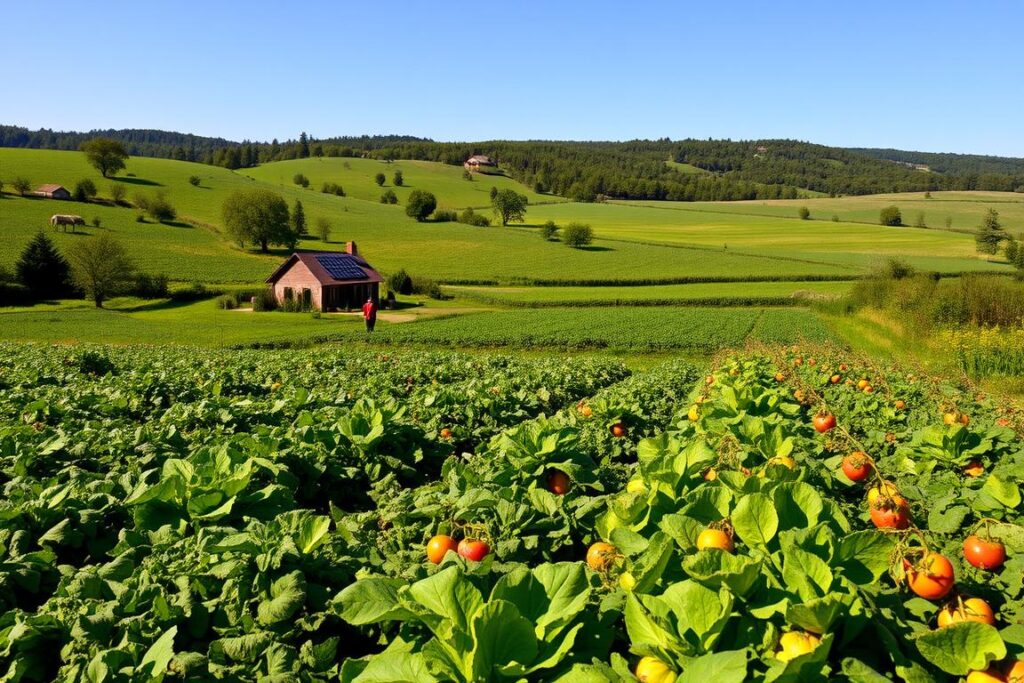
Supporting Local Farmers
Buying organic produce from local farmers is vital for sustainable living. It helps the local economy and supports sustainable agricultural practices.
Here are the benefits of buying from local farmers:
| Benefits | Local Farmers | Conventional Suppliers |
|---|---|---|
| Freshness of Produce | High | Variable |
| Economic Impact | Directly supports local economy | Largely supports large corporations |
| Environmental Impact | Often lower due to reduced transportation | Higher due to longer transportation distances |
In summary, eating organic foods improves our health and supports sustainable living. It promotes eco-friendly farming and boosts local economies.
The Future of Organic Foods
The demand for organic foods keeps growing. This is leading to new trends and innovations in organic farming. As people become more health-conscious and eco-aware, the industry is introducing advanced practices and products.
Regenerative agriculture is a big trend in organic foods. It aims to improve soil health, biodiversity, and ecosystem services. This makes the produce more nutritious. Also, vertical farming is becoming popular. It grows crops in stacked layers, often indoors. This method boosts yield and cuts down on land and water use.
Emerging Trends
- Technology like precision agriculture and drones is being used more. It helps increase crop yields and cut down waste.
- Fermented foods are getting more popular. They are full of probiotics and can help with gut health.
- Organic farming is spreading to new areas. This makes organic produce more available to more people.
Innovations in Production
New things are happening in organic food production, not just in farming. There are big steps forward in food processing and packaging. For example, biodegradable packaging is becoming common. It helps reduce the environmental impact of organic food products. Companies are also finding new ways to reduce food waste through creative processing methods.
The future of organic foods is exciting. It’s not just about keeping things the same. It’s about exploring new possibilities in sustainable farming and healthy eating. We can look forward to more innovation and growth in this area. This will be driven by what consumers want and the need for eco-friendly practices.
Organic Foods and Allergies
Organic foods are a good choice for those wanting to avoid common allergens. They can help reduce symptoms and improve health for allergy sufferers.
Many foods we eat contain allergens like peanuts, tree nuts, milk, eggs, fish, shellfish, wheat, and soy. These can cause serious reactions. Also, conventional farming may use pesticides and chemicals that make allergies worse.
Common Allergens in Conventional Foods
Conventional foods often have more pesticides and chemicals. These can trigger or make allergies worse. Some common allergens in these foods are:
- Peanuts and tree nuts: Often found in many products, they can cause severe reactions.
- Dairy and eggs: Common allergens in many conventional food products.
- Wheat and soy: Used a lot in processed foods, they can be a problem for some.
Benefits of Organic for Allergy Sufferers
Organic foods have many benefits for those with allergies. These include:
- Lower pesticide exposure: Organic farming avoids synthetic pesticides, which can reduce allergy risks.
- Fewer artificial additives: Organic foods have fewer artificial ingredients, good for those with sensitivities.
- Stricter controls on cross-contamination: Organic farming and processing have strict rules to avoid allergen contamination.
Adding organic foods to their diet can help allergy sufferers manage their condition. Organic foods are a valuable option for reducing exposure to allergens.
Budgeting for Organic Foods
We can enjoy organic foods without spending too much with simple strategies. Making healthy eating a part of our lives is key. With a few smart tips, we can make organic foods a regular part of our diet.
Buying in bulk is a great way to save on organic foods. Buying nuts, grains, and dried fruits in big amounts can cut costs. Also, choosing organic produce that’s in season can help us save money.
Cost-Effective Organic Shopping Tips
- Plan our meals around what’s on sale at the local farmers market or grocery store.
- Use coupons or sign up for rewards programs offered by organic food retailers.
- Shop at discount stores or use cashback apps for grocery purchases.
Organic Food Subscription Services
Organic food subscription services offer a convenient and affordable way to get organic foods. These services often give discounts for long-term plans. They also help reduce food waste by providing just what we need.
By using these strategies, we can enjoy organic foods while supporting sustainable agriculture and staying within our budget.
Conclusion: Making the Switch to Organic
Exploring organic foods shows us how they can improve our health and the planet. Choosing organic supports sustainable agriculture. It also helps us eat healthier and reduces our carbon footprint.
Nourishing Our Bodies and the Planet
Organic foods are packed with nutrients and have fewer pesticides. Switching to organic is a big step towards a healthier life. It not only makes us feel better but also helps the environment.
Embracing a Healthier Future
Choosing organic foods is a smart move for our health and the planet. Let’s keep making choices that support healthy eating and sustainable farming. This will help us build a better future for all.
## FAQ
### Q: What are organic foods, and how are they different from conventional foods?
A: Organic foods are made without synthetic fertilizers, pesticides, and genetically modified ingredients. They are grown and processed naturally. Organic farming focuses on soil health, biodiversity, and ecosystem balance.
### Q: Are organic foods really healthier than conventional foods?
A: Yes, organic foods are healthier. They have more nutrients and less pesticide residues and heavy metals. Choosing organic helps us avoid harmful chemicals and supports our health.
### Q: Is it true that organic foods are not pesticide-free?
A: Organic foods are not pesticide-free, but they are made without synthetic fertilizers and pesticides. Organic farming reduces pesticide risk by focusing on soil health and biodiversity.
### Q: How can we identify organic foods when shopping?
A: Look for labels and the USDA Organic seal to find organic foods. Shopping at local farmers markets or using organic delivery services also helps.
### Q: Are organic foods more expensive than conventional foods?
A: Organic foods can be pricier, but there are ways to save. Buying in bulk, using subscription services, and shopping at farmers markets are options.
### Q: Can organic foods help reduce our carbon footprint?
A: Yes, choosing organic supports sustainable agriculture and reduces our carbon footprint. Organic farming promotes soil health and biodiversity, helping combat climate change.
### Q: Are organic foods beneficial for individuals with allergies?
A: Yes, organic foods are good for those with allergies. They have fewer allergens and less pesticide residues. This reduces allergy exposure and supports health.
### Q: How can we incorporate more organic foods into our diet?
A: To eat more organic, try meal prepping with organic ingredients and cooking simple recipes. Shopping at farmers markets or using delivery services also helps. These steps support sustainable agriculture and healthier eating.
